
19 minute read
Coping With The
COPING WITH THE CORONAVIRUS Some community perspectives WORDS BY | DONOVAN M. SMITH
Y UMMY TREATS, A HAPPY ACCIDENT Cherrell Edwards-El
Advertisement
Ican’t cook. Unless we’re talking about some real basic concoctions that add up to a meal more or less. I’m not proud of this for my 28-year-old self.
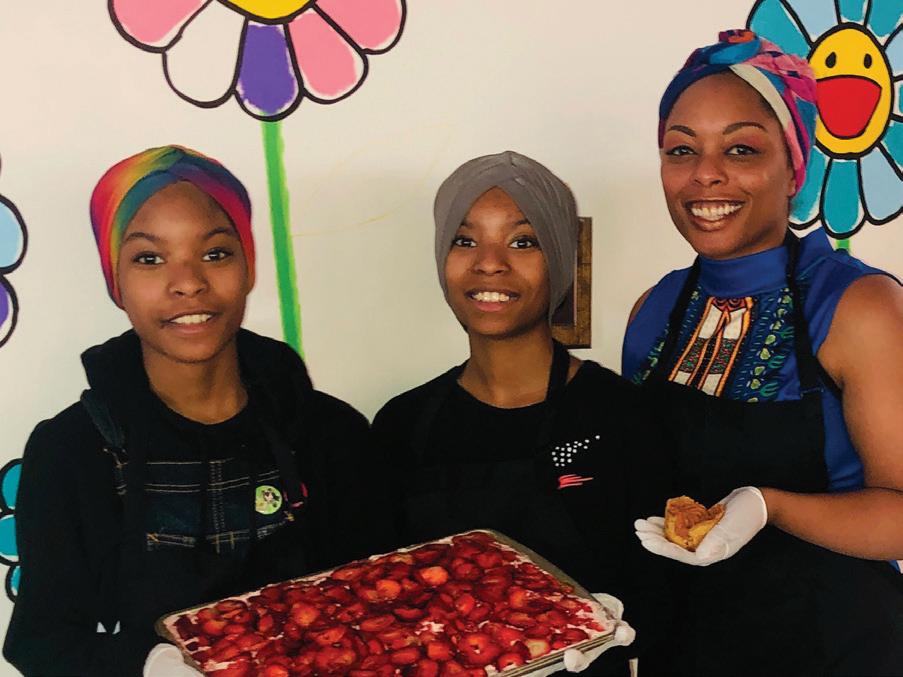
Cherrell Edwards-El was determined to make sure her daughters didn’t end up like me. In her quest to teach twins Olivia and Gracie, 11, the culinary craft, they stumbled into a business.
“From us posting pictures of what we baked, people were saying they would pay for some,” she says. After months of salivating inquiries, Yummy Treats LLC was born. “I’m not a conceited person, so it takes a lot of people telling me the same thing multiple times before I get the confidence in it.”
Now with a small menu of freshly-made personal and bite sized peach cobbler, sweet potato pie, breakfast burrito bites and strawberry pizzas, she says business is booming.
While “The ‘Rona” threatened to take the wind out of her young business at the start of 2020, an unlikely supporter helped her survive the time — inmates.
The Lifers Club at Oregon State Penitentiary wanted to support small business in the wake of COVID-19.
“They placed the first large order I’ve ever had,” she says; 100 pies, plus delivery and tip. “This is not something that was funded by the prison. This was funded solely by the inmates who get paid bare minimum on their jobs and they saved their money.”
Now propelled in part by their support, she’s operating out of a commercial kitchen.
With dreams of distribution in large chain stores like New Seasons and Fred Meyers, Cherell’s core motivation remains the same — her daughters.
“I would really like for this to be a business that my daughters can see go from our kitchen into a factory. My hope is that they see that you don’t have to just go get a job but that we can begin to create jobs.” STILL SPINNIN’ DJ OG One
When you bring people together for a living, a world running on “social distancing” presents quite a conundrum. But as a veteran in the music game, Portland Trailblazer DJ OG One knows as much as anyone that ‘the show must go on.’
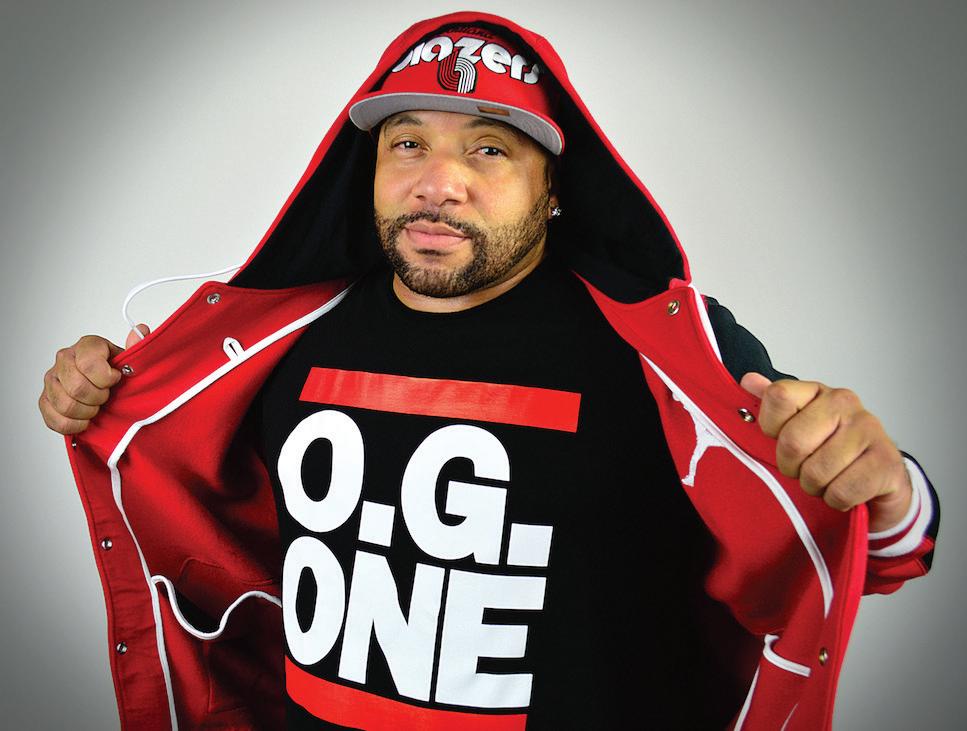
As a man whose job it is to keep stadiums hollering, and dancefloors sweaty, the Governor’s ban on large gatherings meant loss; he had to figure out how to adjust.
Losing nearly $7,000 in the days following the ban, he quickly shifted his business online. While the Trailblazers agreed to pay his salary through the year, he knew he could not rely on that income alone.
“One of the things that became apparent is I can still make money, ” assures DJ OG One. Now, instead of clubs and birthday parties, you can catch him spinning on Facebook and Instagram live. “It’s a way for people to enjoy what I do in public, [but] now they can do it in their personal space.”
His professional development company, Leadertainment, has also shifted things online, offering workshops like “How to Get Your Music to DJs” to the public for a small fee. While online workshops weren’t part of his arsenal before, he says he’s appreciative of the opportunity to give people the knowledge they are seeking with more collective downtime.
“This crisis has given me creative options now. So I can add these to my business platforms to have more diverse options for serving my clients,” he says.
While he’s adjusted for now, and will continue to do some things online, he says he has no idea what happens for him when the show lights cut back on.
Will people want to grind on the dancefloor?
Will people high five a stranger when Damian makes a buzzer beater?
Questions that remain unanswered.

MANAGING LOCKDOWN WITH YOUR KID Germaine Flentroy
One of the most dusty parts of quarantine is the lack of options. Even as an introvert whose not hopping at every chance to be outside, I did like going some places. Not to be hyperbolic, but there’s a reason why social isolation is used as a punishment in jail.
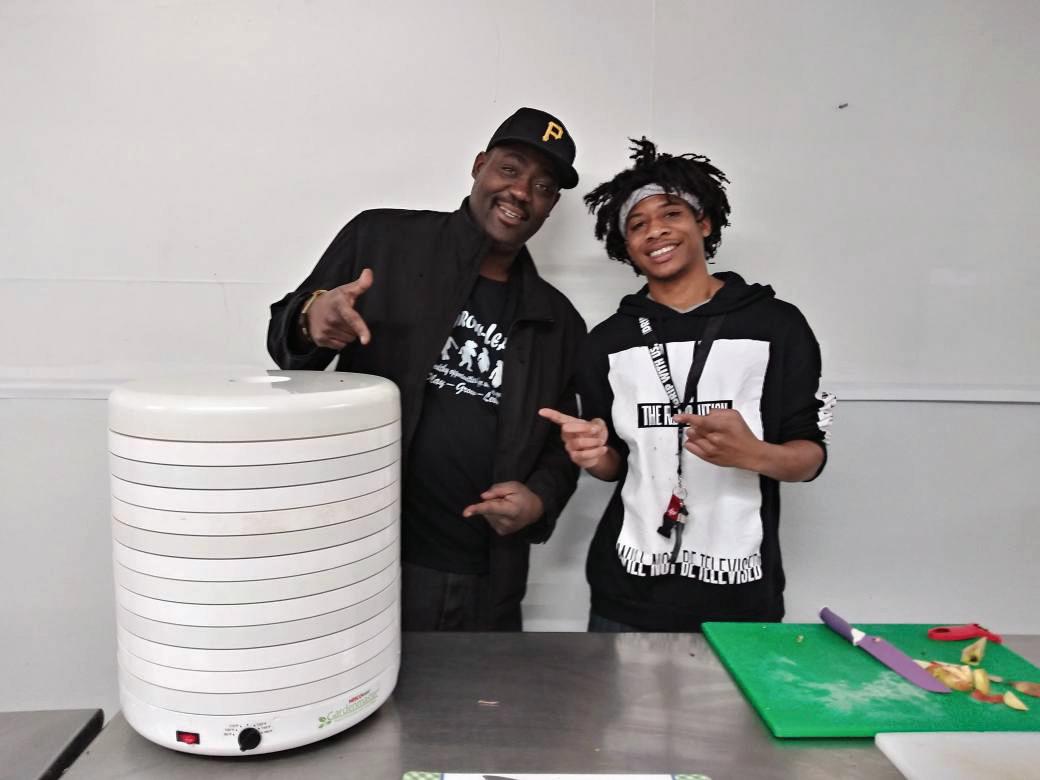
Germaine Flentroy understands this. The co-founder of a direct service organization in East County, Flentroy has seen already high-tensions of many families he works with sear and boil over as COVID-19 constricts around their basic needs.
Parents and kids alike are restless in lockdown, with the added weight of keeping pupils on course for school.
Flentroy understands. “Bottled up energy is going to come out one way or another.” The answer, he says, is innovate.
A father to three elementary students himself, Flentroy transformed his complex to a playground: hallways are now track, bike racks and jungle gyms -- that and socially distanced park visits. He shares footage of his family’s enterprising online to encourage others to remain active, even with limited options.
“You still have to keep your kids on a schedule. My motto is either you’re going to tell the kids what to do or they’re gonna tell you what to do,” he says.
The key to him is to keep going.
“Another goal of mine is to stop smoking. I think it’s going to take a lot of your mental [capacity] to get through this. You keep your mind active, and I think everything will be okay.”

WHY DO I VOTE? Black citizens share their poetic perspectives on the importance of voting

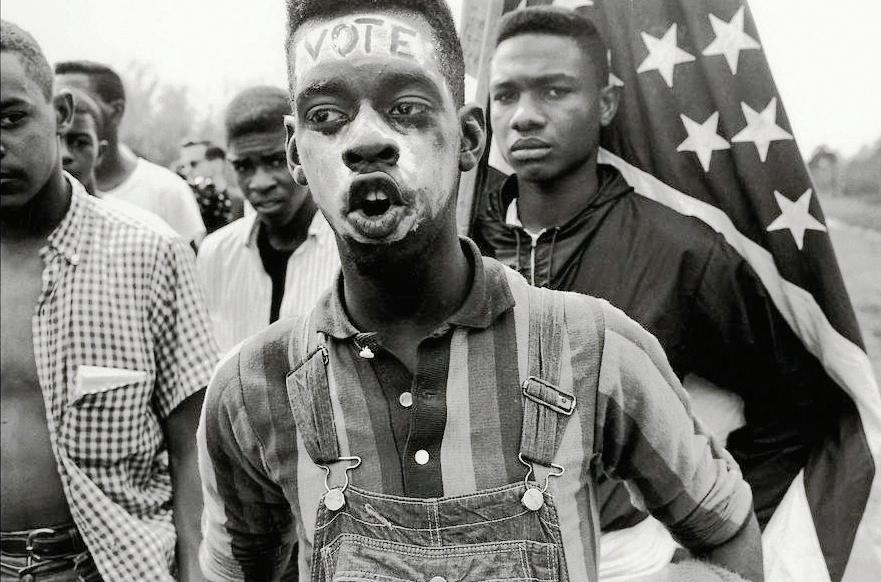
Hailei Aberson-Holford Age: 25
I vote because less than 60 years ago, as a black woman I wouldn’t have been allowed to. I vote because I have privilege. I vote because I know that despite my own successes, some of my community still struggles. I vote because I grew up aware that we had a Dream and believe together we can make a change. I vote because my siblings and future children need me to try. I vote because if I don’t vote, I feel silenced and we deserve to be heard. I vote because I am hopeful.
Name: Sommer Martin Age: 34
I vote because folks who came before me died so I could vote. What a slap in the face to not exercise this right. I vote because I don’t want anybody making decisions for me. Period. I vote because my voice is just as important as the next person. I vote because my vote can directly impact the greater good of my community. I vote because I want to curve the effects of white supremacy and corruption in our current government. I vote because I want to see a better America. I vote because I love Portland and I want it to be a loving, welcoming, and inclusive city.
Richard Gilliam Age: 58
I vote despite Jim Crow, I vote cause I know; I vote like a boss, I vote or I’m lost; I vote like Obama, I vote for my Momma; I vote cause I can, I vote as a Man!
Damon Isiah Turner Age: 46
I vote because I have cousins and Aunts in the South from the Silent Generation and recently departed from the Greatest Generation - that I have heard and learned oral history from of not being able to vote decades ago.
I vote because my mother - from the Baby Boomer Generation - when I was a kid, took me to the exact spot in front of the Lincoln Memorial where she watched the “I Have a Dream” Speech on August 28, 1963 at the March on Washington when she was a kid.
I vote because I observed - being from Generation X - what various American cities looked like when there was “White Flight” to the suburbs due to issues of public safety, race and urban blight in the 1980s and 1990s.
I vote because I observed what various American cities looked like when their grown children returned to American cities in the 2000s and 2010s in the form of Gentrification and displaced many long term residents.
I vote because I have observed what can happen constructively and collectively first hand when my State Representative, State Senator, County Commissioner, City Council Member, Mayor, Congressperson, Senator (and other Senator) - are thoughtful in their approach to public policy.
I vote because I care about fully committing to Participatory Democracy not only for the past, but for Generation Y (Millennials), Generation Z, and Generation Alpha - because authentic leadership, having credible and verifiable information about issues, and ensuring that every American citizen has the accessibility to vote in their Constitutional Republic - matters.
I vote because I can.
Samuel Miller Age: 63
I vote because in our world there are so many challenges and opportunities to RISE UP and let the world know that we STILL matter.
I vote because in order for us to continue to strive for the dreams and hopes for our families and ourselves, we need to insure that the civic leadership in our city, state, and federal government share ALL our ideas for our future.
I vote because to sit in the sidelines and hope that “everything” is going to be okay is both delusional and short sided.
I vote because we can little afford the “status quo” or the apathetic behaviors of our past. Our leaders...on every level MUST bring more than rhetoric and empty promises to our population.
More Equitable Solar.
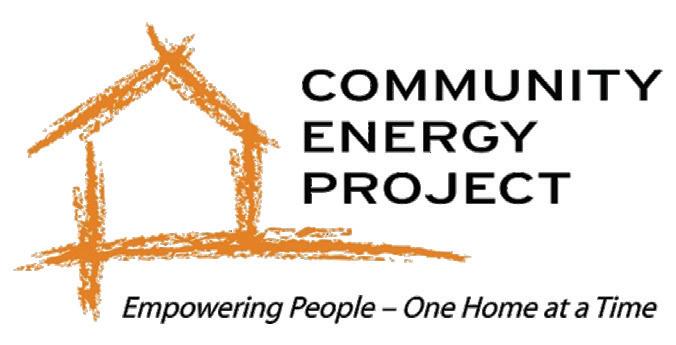
Black communities do not have fair access to solar power, despite the climate crisis disproportionately hurting black communities.
The Oregon Community Solar Program is different from traditional solar. Anyone can subscribe to a large, off-site project with many other people. This means you don’t have to own your home, or even live in a house. You can even take your subscription with you if you move. If you have a lower income, you can experience additional protections and benefits:

Sign Up Today! • Up to 10% annual savings on your electricity bill • Easy intake appointments • No sign up fees or termination fees
Community Energy Project was born out of N/NE Portland, and have proudly served this community for over 40 years. As the Low-Income Facilitator for the Oregon Community Solar Program, our role is to inform low-income participants about this exciting new opportunity in order to decide if community solar is right for them.
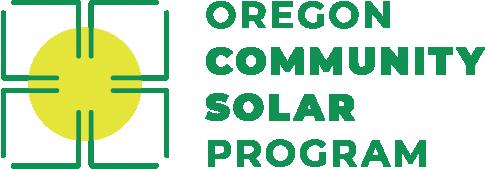
RESOURCE FULL How the Soul District Business Association is utilizing professional peer coaching to help Black businesses build confidence and arrive at successful economic outcomes through effective systems navigation. WORDS BY | MICHELE DARR

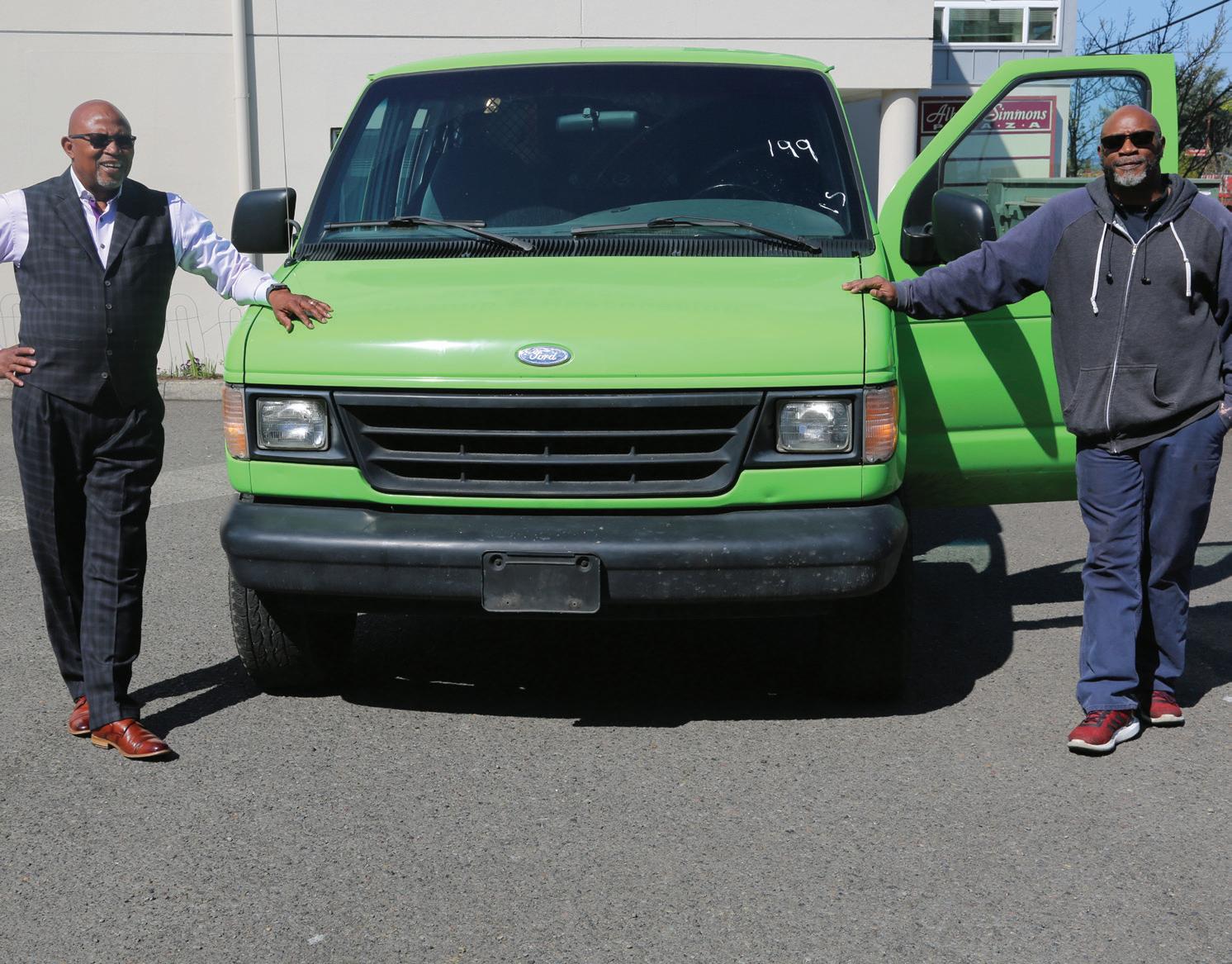
When we hear the words “black on black...”, 10 times out of 10, people are likely to default to the word ‘crime’ as the word that ends that statement. We would like to challenge our readers to shift for a minute and reframe the narrative. Who and what can you think of that exemplifies Black on Black support? How about Black on Black empowerment?
The mainstream media sells us on the exceptions rather than the rule when it comes to defining what it means to be Black in America. In an effort to take back the narrative of their rich and broad cultural and social identities, it is an honor to spotlight the contributions of Black business people who go out of their way to change the rules for engagement and uplift their entire community in the process. Sam Miller and Towanda Perry are two such people whose efforts shine as beacons of hope to others trying to navigate inherently racist systems and surmount built-in roadblocks to their success. verb agree to serve. You only need a heart full of grace. A soul generated by love.” -Dr. Martin Luther King, Jr.
If anyone personifies this quote by the late, great Dr. Martin Luther King, Jr., it’s Sam Miller, who is a paragon of service to others in the community he has called home for decades.
“Media presents people of color in three different lights...we are athletes, bad fathers, sons or we are criminals,” he said sadly. “I grew up in the segregated south in the 60’s with an entire class of people considered to be less worthy, not because of what they had done, but because of how they looked. There are not a lot of profiles of men in our community who get up every day and do their best for their families and community.”
Having worked in the new and used car industry for 28 years, Sam shared his own story of getting a foothold as a business leader in Portland.
“I’m the owner of The Portland Car Company, a virtual automobile dealership, offering people options on how to buy and sell new and used vehicles. I got into the industry via a friend who reached out and offered me a job. Since then, I’ve worked for several large franchise dealerships and a year and a half ago, I decided to start my own company. We’ve gotten a lot of accolades for the way we have conducted ourselves and our business because we value the integrity of the process as much as the profitability of the process. We also deeply value our front line team members and we are vested in protecting them so that they are able to do their jobs effectively and honestly in a way that is laced in integrity and deep value for our customers.”
As a man who tirelessly works to uplift his community, Sam reflected on his motivation for reaching out to and helping others, especially people affected by the blight of racism in countless systemic ways.
“I made a pledge to myself and my parents, rest their souls, that I would always be leading people to a better place. We heard Dr. Martin Luther King Jr. often speak that he had a dream and we understood what he meant and why he said that. I remember thinking that every person has a dream for themselves, their home, their family, and every person wants their children to feel safe. We have a population in Portland with no one speaking to their dreams, so I and my wife do what we can to make a difference, We do food drives that have generated thousands and thousands of pounds of food, have done outreach to make sure that children know that people don’t have to be an athlete to be worthy of respect, that heroes can look like everyday business people who work every day, making sure things get done for family and community.”
Sam’s deep value for people extends far beyond his business ethic and charitable contributions. Through the Soul District Business Association’s peer mentorship and support program as one of the Navigators for the N/NE Community Development Initiatives a partnership with Prosper Portland, he is known far and wide for his generous donations of time, networking, resources and expertise that he shares with other minority business owners throughout the community. Addressing the historic dearth of collaboration amongst Black business owners, he revealed:
“Black businesses often don’t collaborate well together and the reason is that they don’t know how. When a lot of people with limited opportunities vie for a tiny sliver of pie, they get competitive and don’t want to share their “recipes” for success, lest they lose ground themselves,”

he sighed. “The solution is to get the leaders of these small companies to understand that there is a much better chance to succeed if we all work together than if we work separately. This is not about our egos being fed, this is about our families being fed. The partnership between Prosper Portland and the SDBA’s Navigator program takes all the best practices from all the companies that they represent and they share that information and knowledge with whoever steps up and asks for it. If you have a problem, there is a good chance that others have faced the same problem and have a remedy for that to share. The more people and businesses share their common problems and solutions, the more capable everyone is in uplifting each other and others seeking to build and grow.”
Statistically, the prognosis is grim for minorities at every stage of business ownership in the US. While 20 percent of all businesses fail after a year, in the Black community in Portland, it is 50 percent. After 5 years, across the US, 50 percent of all black businesses fail and in Portland it is 80 percent. In the shadow of these overwhelming odds, meeting and joining forces with Sam Miller was a total game-changer for one minority business in particular in Portland, Oregon.
“I have always had an entrepreneurial Spirit,” proudly stated Towanda Perry, owner and founder of NW Affordable Autos. “I own my own business so I can be here for my kids because I always knew if I was self employed, I could be available to them, whether it was at school or at daycare.”
After owning a beauty salon owner for 17 years, she, her boyfriend, Mom, 2 sons, 2 daughters and grandkids took a vote and launched their dream to enter the used automobile industry as a family. After selling 3 cars, they decided to rent a space on Mcloughlin Blvd. where they operated their business before relocating to a less expensive space on Portland Hwy. Less overhead and less risk meant that she could fulfill her calling to help others by providing affordable, reliable vehicles to low income, credit and access challenged people. “Putting as many people into reliable, dependable transportation at an affordable price is my driving force. There are many times where we can make more on a car than what we wind up selling it for, but at the end of the night I want to go home with a clear conscience that we didn’t overcharge anyone. I want to know that the car I sell has been one that I and my grandchildren have personally been in, or my daughter or son. If I can help you, then I consider that to be my greatest success at the end of the day.”


Towanda’s determination is hard won and born of her own experiences as a single mom and a Woman who prevailed despite hard times, incarceration and soul crushing tragedy. “My son was 18 years old when he was murdered out in Gresham in a double homicide in 2008,” she remembered. “He was in a gang and so when he and another gang member saw each other, it was a shootout. They both died and another young man who was with them survived and was given a 10 year sentence. About 9 months later, we lost my son’s grandmother to cancer and 2 years later, we lost my daughters father in
Towanda Perry NW Affordable Auto Pictured: June 2011.” Beyond the difficulties she has had to surmount on a personal and familial level, navigating the minefields of systemic racism posed even greater obstacles to overcome.
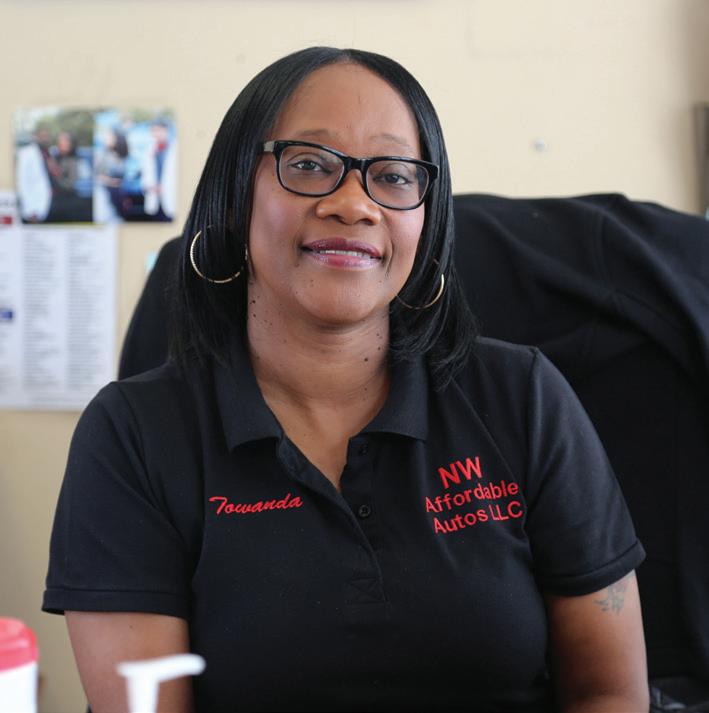
“My biggest challenge has been as a Black female entering into a world that is predominantly white and non-female oriented. One of my other challenges is having a criminal background and trying to access the funds and resources that are needed to function and operate.”
After meeting and connecting with Sam Miller and the Navigator program through an SDBA networking event her brother attended, Towanda found the support and resource-fullness she needed to take her business to the next level.
“Towanda was struggling in a lot of areas and that’s because the rule books on how to run a successful business have a lot of missing pages for us in the Black community,” shared Sam. “Access to information is certainly a huge challenge when we are left out of a lot of the inner circles of conversation. I was able to sit down with her and line by line, go over how to run a successful business. We have already spent a couple hundred hours together at this point because I love to watch her be something she didn’t think she could be. As such a wonderful person in the community, so many people owe her a debt of gratitude for helping them get into reliable vehicles and has often done that at her own risk to ensure that their needs are met. She and her son, Anthony and brother Jeff are truly amazing and the fact that she listened and follows our advice so far, I believe that she is going to be one of the more successful used car franchises in Portland.”
“If there is one person who has made the biggest difference in helping put our business on the path to success, it’s Sam Miller,” Towanda remembers with a huge smile. “We do exercises in budgeting, marketing, and financing. He has shared his connections with me, shared people who he buys and sells cars with, auction stuff, giving us insight and detail on how to draw more customers to the lot, how we can advocate more effectively for our customers, just a ton of support, leading and guiding us in ways that are helping us meet our needs. It’s been so valuable that he has become my right hand guy. To do all of that, I couldn’t put a price on that.”
“DL Hughley says you cannot be a man until you see one,” Sam concluded. “I’ve seen so many people’s lives transformed by the support they have received from the partnership between the SDBA Navigator program, Prosper Portland and the people who need support. I thank God every day that I’m able to be part of the solution. Being in a position to help someone change their life and open doors previously closed to them so they can look their children in the face and say to them “we are going to be alright” is the greatest gift I receive from the work we are doing together. I will continue to do this and as long as my limbs and lungs will carry me.”

